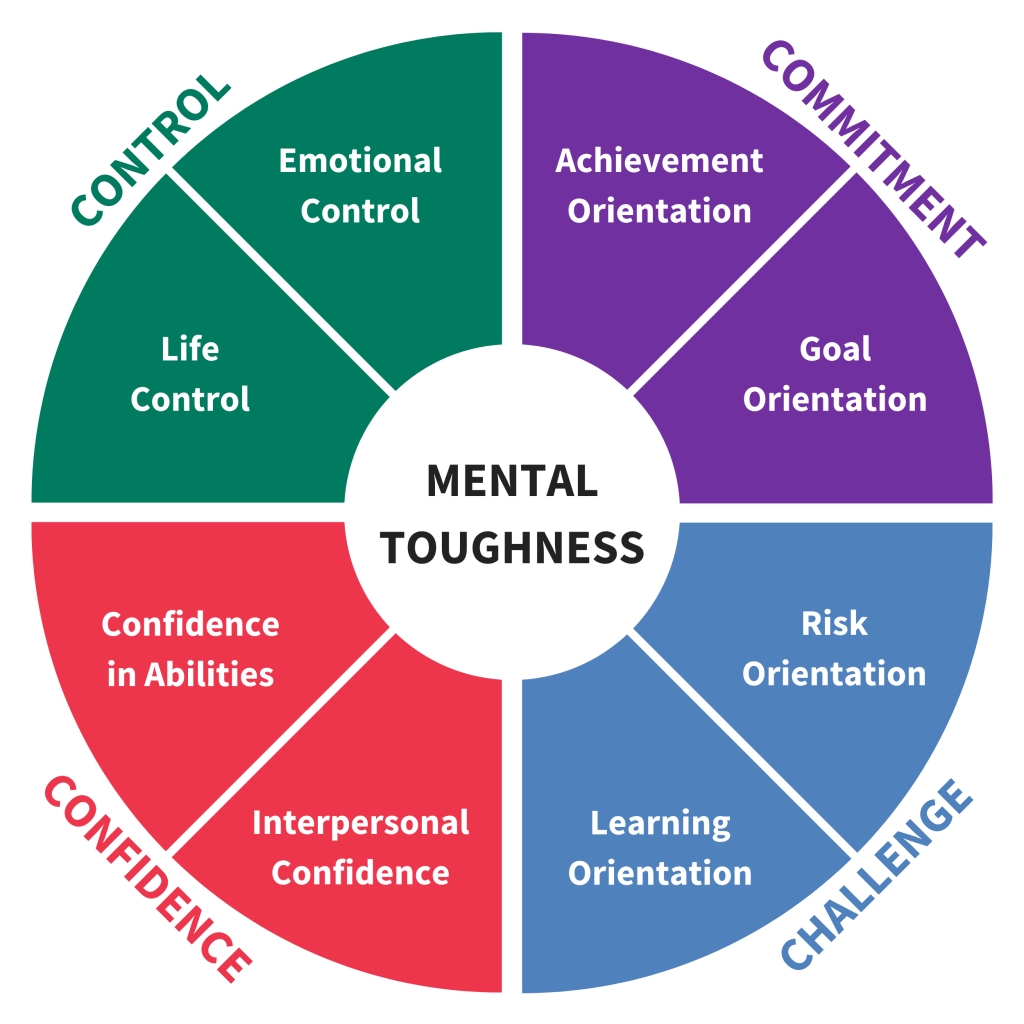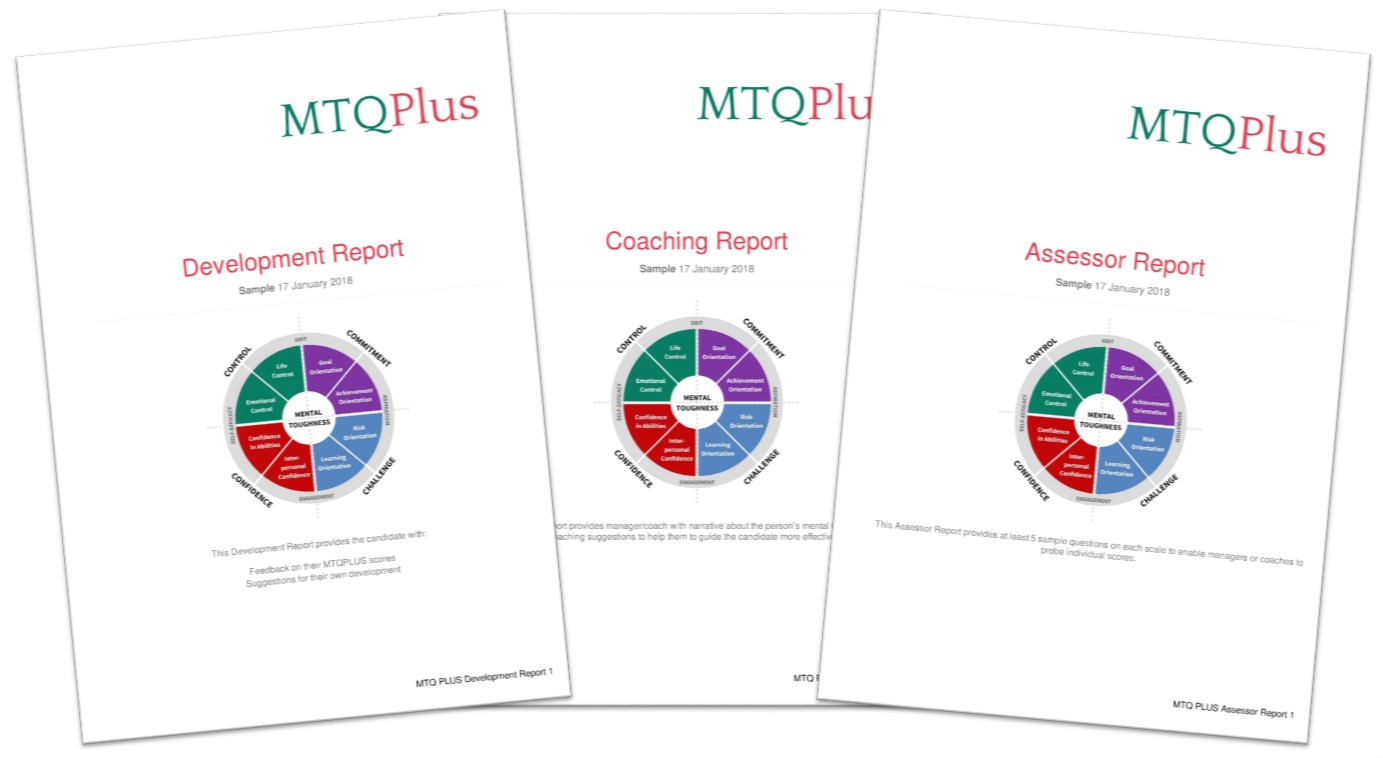Firstly, Mental Toughness is not about being macho in any sense. It is entirely about our ability to be “the best version of ourselves that we can be”. This is, of course, central to development activity for virtually everyone on the planet.
It is a very well evidenced psychological concept. Mental Toughness is a personality trait which determines to a significant extent how we respond to life – its stressors, pressure, challenge and opportunity. Its roots lie in Health Psychology. It has a major role in understanding well-being. The term Mental Toughness originates in Sports Psychology where it is a widely used concept to examine performance.
What does it add to what we can do?
Mental Toughness differs from most widely used personality concepts in that it describes “how we think”. Most personality models and measures used in people and organisational development are describing and predicting behaviour – “what we do when confronted by events”. This is of course, useful but perhaps not as useful as understanding “why we behave the way we do”.
Understanding Mental Toughness provides the opportunity for that insight. This is fundamentally important if we are to change behaviour, where this is needed, and to understand why some events create an issue for some but not for others.
Professor Peter Clough, who developed the 4Cs framework, which is now the most widely adopted in the world, usefully describes it as “the mindset to deal with life as it happens, taking setbacks in our stride and understanding that we will experience life’s ups and downs but that we can also see opportunity even in the dark times.”
Research shows that mental toughness correlates closely with performance, wellbeing, mental agility and aspirations – all interrelated and all central to success for individuals and organisations.
Mental Toughness is also a spectrum. At one end, Mental Toughness and at the other end, Mental Sensitivity.
These are not ways to label people, these are not good and bad. Both extremes carry potential weaknesses as well as strengths. We all sit somewhere in that spectrum.
It is perfectly possible for a mentally sensitive individual to be effective and successful – provided they are self-aware about their mental toughness and develop strategies to use what they learn. The same is true for the mentally tough. They can struggle without the same self-awareness.
What do we understand about Mental Toughness – what is it?
Professor Clough developed the initial 4Cs framework in 2002. Since then, a collaboration between Doug Strycharczyk, CEO for AQR International, Professor Clough and Dr John Perry has identified 8 factors which provide a significant depth of understanding about the concept. This is summarised below in the so-called Pizza image.
Bear in mind that these are descriptors of mindset. Individually and in combination, they are extremely useful in explaining behaviour.
You can see how they can also link to many other related concepts which occupy development practitioners – especially those who are engaged in coaching and mentoring.
Can we reliably assess Mental Toughness?
A hugely important question. We can generally observe behaviour. We can’t easily observe what is happening in someone’s head (or even in our own head). It is easy to misdiagnose this and it happens more frequently than we would like.
The 8-factor model enables users to identify the particular issues that are relevant for each individual. We can have the same level of overall mental toughness but our profile, across the 8 factors, can be very different. This degree of complexity is extremely difficult to assess confidently and reliably.
A key by-product of Professor Clough’s work was the development of the Mental Toughness Questionnaire, a reliable and valid psychometric which helps users to assess mindset in these 8 factors.
This provides users with a powerful ability to work with clients to develop a level of self-awareness which is difficult, perhaps impossible, to achieve by other means. Moreover, it is a normative measure which means that it can be used before and after a programme to assess where change has occurred.
Similarly, it is possible to work with groups and whole populations to assess mental toughness and aggregate results to get a view on a key aspect of culture. This is also important. There is a clear connection between culture and influence on individual behaviour.
The MTQ Mental Toughness Questionnaire is now available in 3 formats.
Can we develop Mental Toughness?
The million-dollar question. The short answer is “we can”. Although there is an important caveat here.
Although research shows that there is a genetic factor in our mental toughness it is also the case that our mental toughness also reflects our experiences and what we learn from them. For many of us, we have learned to be mentally tough or mentally sensitive. Think of the current debate about the “snowflake generation”.
So, if we have learned to think in one way, we can re-learn to think if we reflect on what we experience and draw new lessons from that.
The first caveat. There is no implicit imperative to develop our mental toughness. Rather the key is self-awareness and reflection on what this means for the way we go through life.
Some who are mentally sensitive will be happy to remain as they are and will benefit from learning and adopting techniques and approaches which the mentally tough will adopt. In that sense, they learn to cope and often will usefully learn about their strengths and use those to optimises performance well-being and so on.
Others will identify the benefit of a change in some aspects of mental toughness and will purposefully seek to change in some way. They are learning to deal with their state.
The second caveat is that it is extremely difficult to target Mental Toughness for development. Rather it is more effective to target one or more of the factors which make up Mental Toughness -= such as Emotional Control or Risk Orientation. Changing the factors will in turn impact on the overall Mental Toughness of an individual.
The 8-factor framework effectively operationalises the Mental Toughness concept. It also means that those involved in development activity are able to target their interventions more precisely – on one or more of the factors.
In terms of development activity, Experiential Learning is extremely effective here whether it is exposure to situations or, through coaching, reflecting on experiences, past and current, and extracting the learning from these. Which is why it fits extremely well with coaching and mentoring approaches
The kind of interventions which enable development is also well known to many – positive thinking, anxiety control, attentional control, visualisation, etc. Interestingly there is support here too for a more accurate assessment of an individual’s mental toughness through the use of MTQ. It enables us to target interventions more specifically avoiding the “one size fits all” approach which plagues a great deal of individual and organisational development.
In summary
The Mental Toughness concept, particularly in its 4Cs and 8-factor format brings an important insight into the fundamentally important “why” question. The development of the concept to enable a more accurate assessment and, through that, better-targeted development creates a more complete approach.
Although not explored here, it is also a concept which embraces neatly and links well with, a number of relevant concepts whether they are about resilience, motivation, leadership or even talent management. Individually and collectively, mindset is the common thread.
Ultimately, a major strength is the exposure of practices to academic enquiry and rigour to create a concept that meets two of the most pressing issues in our time:
- Professionalism – it is well-founded and capable of withstanding scrutiny. Important in a profession still dogged by faddism
- Evidence-based practice. Outcomes are often easier to evidence than enablers. The MTQ provides the capability to evidence one of the most important enablers – one that has often been described as impossible to assess.





